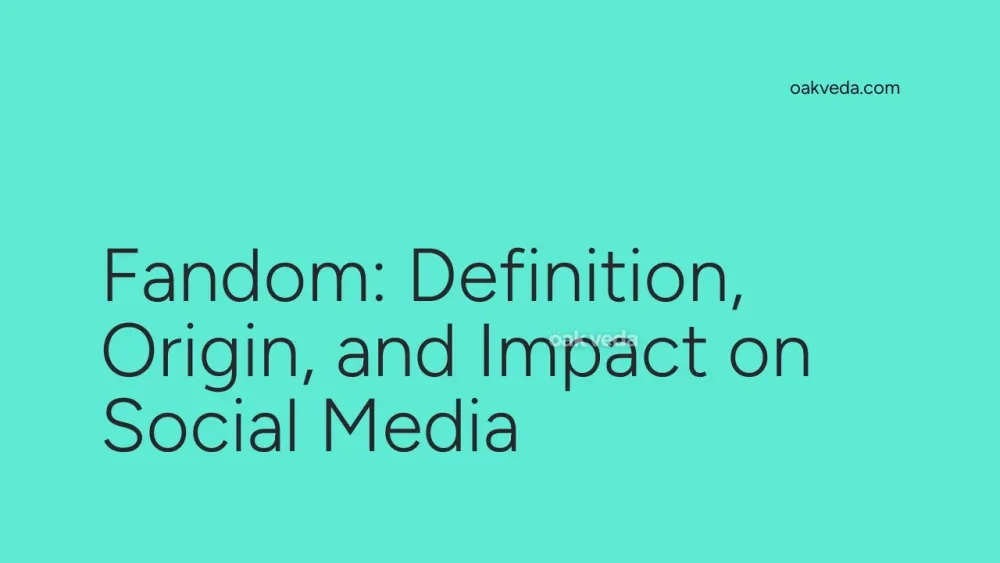
What is Fandom?
A fandom is a passionate community of fans who share a deep enthusiasm for a particular piece of media, celebrity, or cultural phenomenon. In the context of social media, fandoms represent interconnected groups of individuals who come together online to celebrate, discuss, and create content related to their shared interest. These digital communities have become a significant force in shaping pop culture, influencing marketing strategies, and even impacting the creative direction of their beloved franchises.
Origin and Development of Fandom
While the concept of fandoms has existed long before the internet, social media has dramatically transformed how these communities form, interact, and grow. The term "fandom" itself dates back to the early 20th century, originally used to describe groups of science fiction enthusiasts. However, the rise of social media platforms in the early 2000s revolutionized fandom culture, providing unprecedented opportunities for fans to connect globally.
Platforms like MySpace, LiveJournal, and later Facebook, Twitter, and Tumblr became breeding grounds for fandoms. These digital spaces allowed fans to share fan art, fanfiction, memes, and theories about their favorite subjects, fostering a sense of belonging and shared identity among members.
How Fandom Works on Social Media
On social media, fandoms operate through various mechanisms:
- Hashtags: Fans use specific hashtags to organize discussions, share content, and make their posts discoverable to fellow enthusiasts.
- Fan accounts: Dedicated profiles that curate and share content related to the fandom's subject.
- Group chats and forums: Spaces for in-depth discussions and real-time interactions among fans.
- Content creation: Fans produce and share original artwork, videos, memes, and written content inspired by their fandom.
- Live-tweeting and event participation: Fans engage in real-time discussions during live events or new releases related to their fandom.
Types of Fandoms
Fandoms can revolve around various subjects, including:
- Entertainment: TV shows, movies, books, and video games
- Music: Bands, solo artists, and genres
- Sports: Teams, athletes, and leagues
- Celebrities: Actors, influencers, and public figures
- Brands: Companies with cult-like followings
Popular Examples of Fandoms
Some of the most notable fandoms on social media include:
- Harry Potter: Known for its extensive lore and active online community
- Marvel Cinematic Universe: Fans eagerly discuss theories and share content about superhero films and TV shows
- K-pop groups: Highly organized fandoms supporting Korean pop music acts
- Star Wars: A long-standing fandom with a rich history of fan engagement
- Taylor Swift's "Swifties": Known for their dedication and ability to decode the artist's hints and easter eggs
Impact of Fandom on Social Media Culture
Fandoms have significantly influenced social media culture in several ways:
- Content creation: Fandoms drive user-generated content, contributing to the overall social media ecosystem.
- Trend-setting: Popular fandoms often spark viral trends and memes that spread beyond their communities.
- Platform evolution: Social media platforms have adapted features to cater to fandom activities, such as Twitter's "Communities" or Facebook's "Groups."
- Digital activism: Fandoms have mobilized for social causes, using their collective power to raise awareness and funds.
- Influencer culture: Many influencers have emerged from within fandoms, leveraging their engaged audiences.
Controversies Surrounding Fandoms
While fandoms can be positive forces, they sometimes face criticism for:
- Toxic behavior: Instances of harassment, bullying, or excessive defensiveness towards criticism
- Parasocial relationships: Unhealthy attachments to celebrities or fictional characters
- Gatekeeping: Exclusionary practices that alienate new or casual fans
- Cancel culture: Rapid mobilization against individuals or entities perceived to have wronged the fandom
How Brands and Influencers Use Fandoms
Savvy brands and influencers have recognized the power of fandoms and often engage with them through:
- Targeted marketing campaigns: Creating content that resonates with specific fandom interests
- Collaborations: Partnering with fan accounts or fandom leaders for promotions
- Fan-inspired products: Developing merchandise or experiences based on fandom preferences
- Interactive experiences: Hosting virtual or real-world events that cater to fandom interests
- Social listening: Monitoring fandom conversations to inform product development and marketing strategies
Future Trends Related to Fandoms
As social media continues to evolve, fandoms are likely to see several developments:
- Virtual reality spaces: Immersive environments for fans to interact and engage with their interests
- AI-powered fan experiences: Personalized content and interactions based on individual fan preferences
- Blockchain and NFTs: New ways for fans to own and trade digital assets related to their fandoms
- Cross-platform integration: Seamless fandom experiences across multiple social media platforms
- Increased brand integration: More sophisticated partnerships between fandoms and commercial entities
FAQs about Fandoms
-
How do I join a fandom on social media? Start by following relevant hashtags, joining fan groups, and engaging with content related to your interest.
-
Can fandoms influence the creation of content? Yes, many creators and producers now consider fandom feedback when developing new content or storylines.
-
Are fandoms only for young people? No, fandoms span all age groups, though younger demographics tend to be more active on social media.
-
How do fandoms impact marketing strategies? Brands often tailor their marketing to appeal to specific fandoms, recognizing their influence and engagement potential.
-
Can being part of a fandom be a negative experience? While fandoms can provide a sense of community, it's important to maintain a healthy balance and avoid toxic behaviors.
In conclusion, fandoms have become an integral part of social media culture, shaping how we interact with content, celebrities, and brands online. As digital platforms continue to evolve, fandoms will likely play an increasingly significant role in driving engagement, creativity, and community-building in the social media landscape.
You may be interested in:
- "I'm Baby": Definition, Origin, and Impact
- Tube Girl: Definition, Origin, and Impact on Social Media
- Target Audience: Definition, Origin, and Impact on Social Media
- Aesthetic: Definition, Origin, and Impact on Social Media
- DC (Dance Credit) on TikTok: Definition, Origin, and Impact
- Chronically Online: Definition, Origin, and Impact

